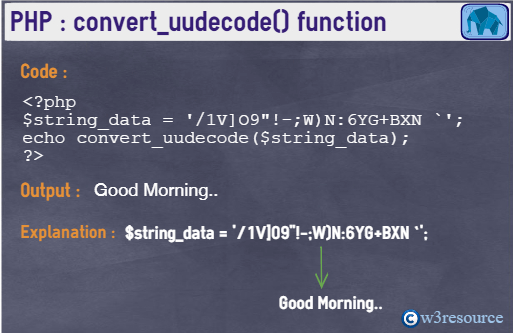PHP: convert_uudecode() function
PHP: Decode a uuencoded string
The convert_uudecode() function is used to decode a uuencoded string.
Version:
(PHP 5)
Syntax:
convert_uudecode(string_data)
Parameter:
| Name | Description | Required / Optional |
Type |
|---|---|---|---|
| string_data | The uuencoded data. | Required | String |
Return values:
The decoded data as a string.
Value Type: String.
Pictorial Presentation

Example:
<?php
$string_data = '/1V]O9"!-;W)N:6YG+BXN `';
echo convert_uuencode($string_data);
?>
Output:
Good Morning...
View the example in the browser
See also
Previous: convert_cyr_string
Next: convert_uuencode
